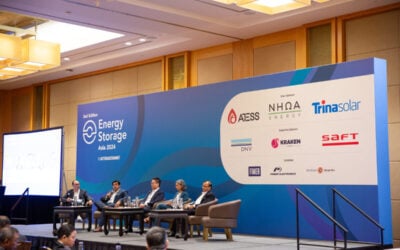SMA’s launch of Sunny Boy Storage for high voltage batteries will begin in Germany before going to markets including Italy, Australia, the US and the UK. Image: SMA.
SMA is aiming to tackle the market for retrofitting energy storage systems in to existing home PV installations, with a new AC-coupled version of its Sunny Boy inverter suitable for high voltage batteries.
The Germany-headquartered inverter maker, which provides inverters for off-grid, grid-connected and so-called hybrid systems, announced the launch of Sunny Boy Storage, a battery inverter which the company said is, “…designed especially for high-voltage batteries like the Tesla Powerwall”.
An SMA representative this morning confirmed to PV Tech and Energy Storage News that the Sunny Boy Storage is compatible with the Powerwall. The device joins inverters from Fronius and SolarEdge in this regard, with those two the only confirmed to be compatible at the time of Powerwall’s launch last year. The latter also just released its StorEdge inverter into international markets. Incidentally, The Guardian reported today that Australia’s first Tesla Powerwall has been installed. State government owned utility Energex in Queensland has installed the system as part of a year-long trial, the newspaper said.
SMA chief executive Pierre Pascal Urbon highlighted that according to some estimates, the number of grid-connected energy storage batteries in German homes has almost doubled in a year, with the figure reaching around 30,000 installations.
Try Premium for just $1
- Full premium access for the first month at only $1
- Converts to an annual rate after 30 days unless cancelled
- Cancel anytime during the trial period
Premium Benefits
- Expert industry analysis and interviews
- Digital access to PV Tech Power journal
- Exclusive event discounts
Or get the full Premium subscription right away
Or continue reading this article for free
Once accounting for around a 40% share of the PV inverter market worldwide, SMA has encountered some turbulent times of late, which some analysts have attributed largely to a huge increase in competition in the inverter space. However in November the company increased revenue guidance for 2015 which PV Tech’s Mark Osborne reported was “due to stronger than expected demand across international markets”. Urbon said the company had completed a turnaround, which included restructuring and job losses “earlier than expected”.
AC-coupling for retrofit integration
In a statement, Volker Wachenfeld, head of SMA’s off-grid and storage unit and contributor to Energy Storage News’ guest blog, talked up the potential for the new device for retrofits. Claiming SMA to be the first to market with an AC-coupled solution for high voltage batteries, Wachenfeld said the battery storage system can be ”easily and cost-effectively” integrated into existing systems.
As the battery will operate in parallel with the PV system’s circuits, rather than a series connection which would necessitate shutting down the solar array. Many energy storage markets, including the UK which has over 700,000 domestic PV installations but where support schemes for clean energy are dropping in economic attractiveness, could be propelled forward in their early stages by adding batteries to households’ existing PV systems.
While this could give it an edge in retrofits, the SMA spokeswoman this morning said that “retrofit and new installations are equally important for us”.
In addition to making the new inverter Powerwall compatible, SMA claimed that it is “…collaborating with almost all well-known battery producers” to “ensure maximum long-term reliability and flexibility for end users”.
The UK has around 700,000, Australia an estimated 1.5 million existing PV installations that energy storage could potentially be retrofitted to. Image: Rexel.
Competing with utility power
SMA’s chief Urbon said that the company hopes to be able to provide power cheaper than Germany’s utilities. Beginning with Germany as the initial launch market with sales beginning in March, SMA said it would then go to Italy, which now has interconnection rules for storage in place, Australia and the US, both earmarked as attractive enough for Tesla and others to launch their stationary storage products first into, and the UK.
Another company aiming to use energy storage to compete with the cost of utility power in Germany is Sonnen, formerly Sonnenbatterie (a brand name which the company still uses in some markets). Sonnen started up SonnenCommunity in November, which networks the energy management portion of some of its customers’ energy storage systems together to trade energy at the best rates available via the grid.





